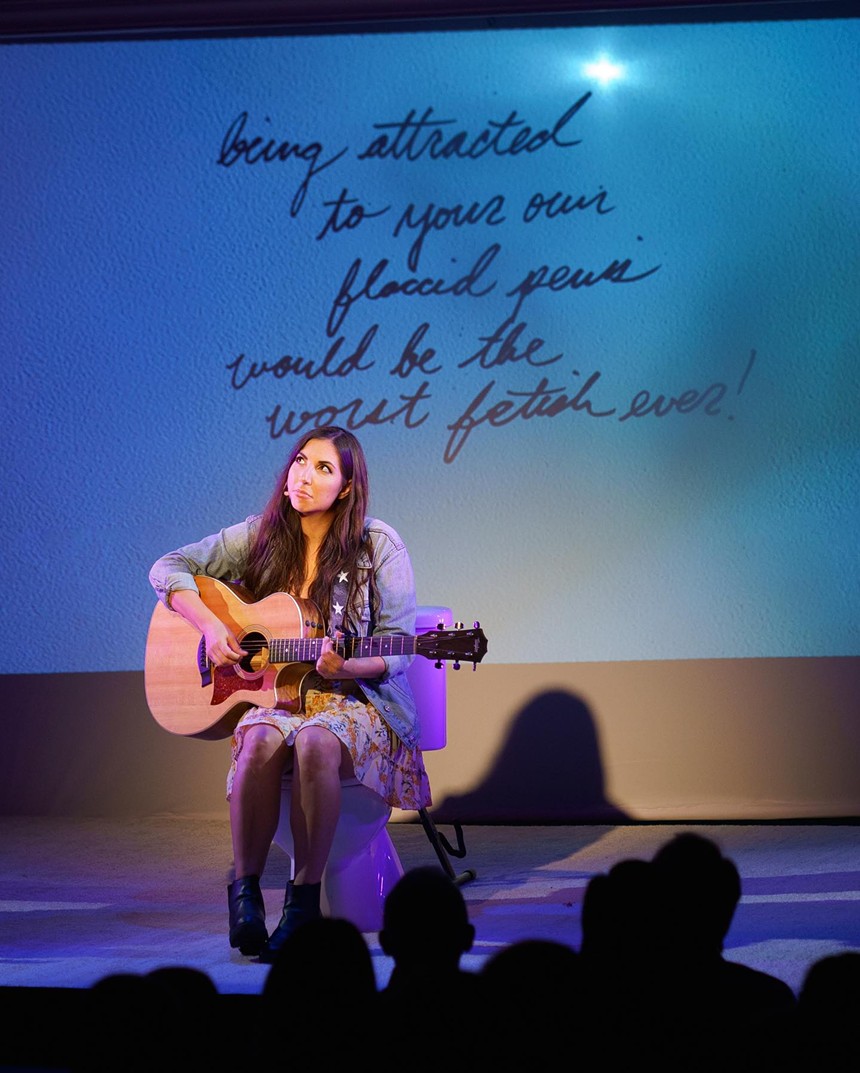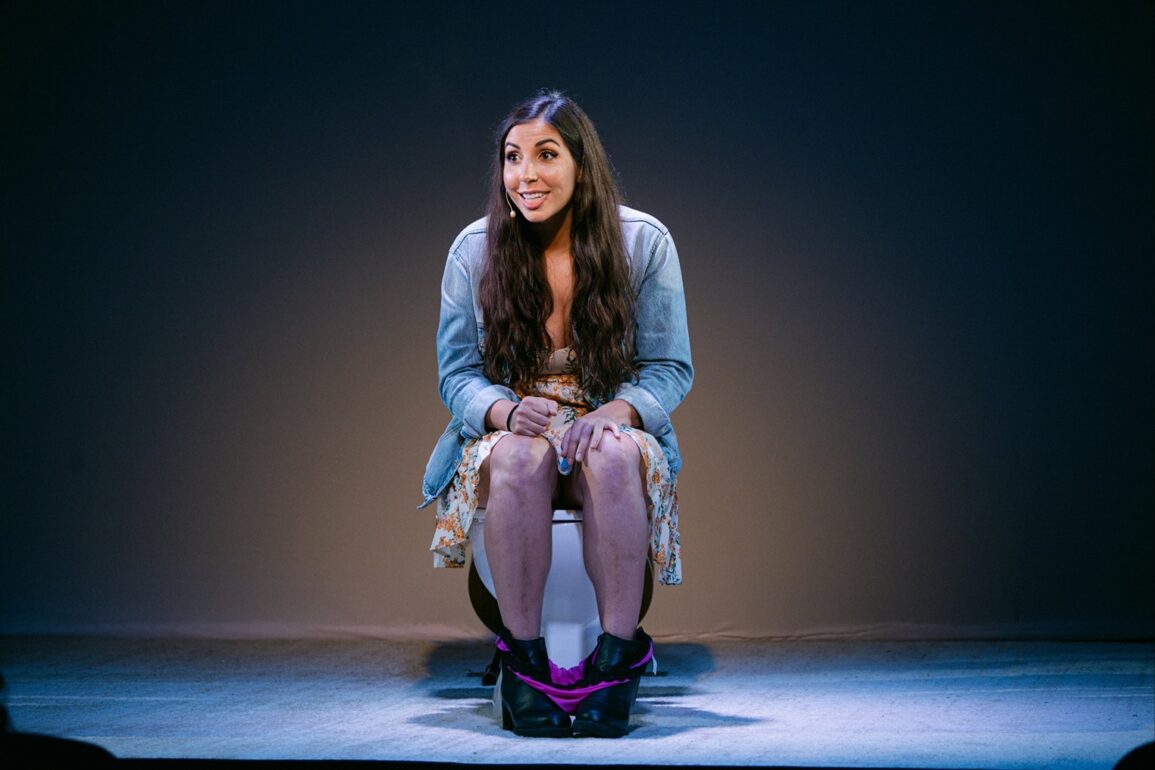When singer-songwriter Caitlin Cook was studying art history as an undergrad, she “started to get very frustrated with how pretentious that world can be,” she says. “I was always very drawn to graffiti, especially bathroom graffiti, because it was so dismissed.”
But those privy scribbles are front and center in Cook’s musical The Writing on the Stall: A One-Woman Bathroom Graffiti Musical, where bathroom banter is transformed into showstopping masterpieces. “I once stumbled across this piece of graffiti, which has become one of the first parts of the show now, which said, ‘Since writing on bathroom walls is neither for critical acclaim nor financial reward, it is the purest form of art. Discuss,’ and I just loved it,” Cook recalls. “I started photographing bathroom graffiti everywhere for about a decade. It was a funny obsession of mine.”
The Writing on the Stall is not your typical Broadway fare. Instead of grand sets, you get a dive bar toilet; in place of sweeping ballads, you get songs about life’s more risqué pleasures, such as a cowboy dick. And let’s not forget the slingshotted panties and milk pistols — elements you’d never guess would be so suited to musical theater.
The show, written and performed by Cook, turns the typically overlooked art of bathroom graffiti into the star of the show. Set to grace the stage at the Comedy Fort in Fort Collins and the Bug Theatre in Denver, The Writing on the Stall invites audiences into a world where those bathroom walls speak louder than words.
“I’ve always really loved found art, which is created by modifying other objects,” Cook says. “I remember finding this folder full of bathroom graffiti images, and I was like, ‘I’d love to share this with people on stage somehow.’ So I decided to try writing lyrics about them for a song. I’ve always been a songwriter. I wrote my first song when I was four years old, and I have been doing standup comedy for a long time, so this musical feels like a natural progression from my obsession with bathroom graffiti.”
Mindy Tucker” class=”uk-display-block uk-position-relative uk-visible-toggle”>

Singer-songwriter Caitlin Cook turns bathroom banter into showstopping masterpieces.
Mindy Tucker
The process of developing a quirky idea into a full-fledged musical included categorizing the graffiti by thematic threads that would be developed into songs. Cook decided to project images of graffiti during the show, which she would change while singing and playing the guitar with a foot pedal.
“It worked well, and the first time I ever did it at this little bar in Bushwick, I just felt something click,” Cook recalls. “The audience loved it. I had done a song about graffiti in my first show, Death Wish, at the Edinburgh Fringe Festival, and it always blew the roof off. It just hit this zeitgeist — everyone has seen something written in the bathroom before. I had so many images that didn’t make it into the song, and I started to wonder if I could write a whole musical. A week before I was about to do a residency, I sat down and wrote all the songs. I wrote about the difference between men and women in stalls, one with all the poetic, beautiful and sad things people have written, and another that chronicles people’s responses to each other. I had a blast creating songs from all these various categories.”
Cook’s collaboration with director A.J. Holmes, a Broadway veteran and member of StarKid Productions, brought a unique blend of comedy and music to the project. The production’s mix of show tunes and standup exemplifies this synergy.
“A.J. comes more from the Broadway world, and I come more from the comedy world, but we both love both comedy and music,” she explains. “I’ve always really loved people like Bo Burnham, Tim Minchin, Flight of the Conchords, Tenacious D, Catherine Cohen, Natalie Palamides and a bunch of people in the clown world. I’m interested in funny songwriting because it’s so hard to do. If you can predict a rhyme, it’s not funny, because comedy relies on surprise and subverting expectations, so it’s fun to take all those tropes, flip them on their heads and try new things to break those structures.”
Courtesy of Mindy Tucker” class=”uk-display-block uk-position-relative uk-visible-toggle”>

Director A.J. Holmes and Caitlin Cook.
Courtesy of Mindy Tucker
After touring New York with The Writing on the Stall, the team decided to take it to the Edinburgh Fringe in 2022. “But it didn’t quite pop there,” Cook admits. “We got good responses, and the songs always did well, but the thread we were trying to bring to the show wasn’t quite clicking, because I think I wasn’t putting enough of myself into it.”
Since Cook put so much of her life story into her first outing at the festival, Death Wish, she decided to write a less personal show for her second project. However, since the show simply musicalized the graffiti, “people ended up walking away thinking the show was fun, but they didn’t learn anything about me as a person or why graffiti matters to me,” she says.
Cook took a break from The Writing on the Stall to work on other projects for a time. “But when I got the opportunity to do an off-Broadway run [at the SoHo Playhouse in 2023], I decided to revisit the script with my producer, Ali Gordon,” she says. “She is a great improviser with a good instinct for how people actually respond to different situations.
“And then, right before we were about to start going through the script, I went and saw this beautiful show [Sorry for Your Loss] by standup comedian Michael Cruz Kayne at the Minetta Lane Theatre,” Cook says. “It’s a show about death and grief that’s so sad but also cathartic, hilarious and so authentically him. I walked away knowing exactly who that person was on stage, and I felt like I contributed something as an audience member. It was exactly what I wanted people to walk away with. Although I was supposed to hang out with friends after the show, I told them I needed to go home and write. After riding my bike home, I opened up the scripts for Death Wish and The Writing on the Stall and began Frankensteining them together to arrive at this version, which Ali and A.J. helped me iron out.”
Courtesy of Arin Sang-urai” class=”uk-display-block uk-position-relative uk-visible-toggle”>

“This musical feels like a natural progression from my obsession with bathroom graffiti,” says writer and performer Caitlin Cook.
Courtesy of Arin Sang-urai
The immersive, confessional and comedic show is more than just a laugh riot; it’s a journey through the human condition as seen through the lens of anonymous scribblers. Audiences can expect a cocktail of hilarity and vulnerability, served in a setting that feels both intimate and universal. “I treat the audience like a group of women bonding in the bathroom, and they get to open up to me, so by the end, we’re all best friends,” Cook shares. “It’s been fun to hang out with people afterward and take pictures. People will show me their graffiti, and they’ll reveal vulnerable things about themselves.”
The future looks bright and busy for The Writing on the Stall. With viral buzz and interest from Tony Award-winning Broadway producers, Cook is planning to continue touring the production to as many cities as possible while she prepares what comes next for the musical.
“My main plans are to tour it a lot this year and potentially do another run in New York,” Cook says. “It’d be nice to do a longer run somewhere where I can build out a better, bigger set. I have dreams of having bathroom stalls behind me, with bandmembers sitting in each stall so it’s not just me on stage. I’m also planning to film it for streaming services, but if that doesn’t work out, I’ll post it on YouTube. I’m also working on a TV adaptation that I’m really excited about, because Fleabag is another big inspiration for me. That show began as a one-woman show at the Edinburgh Fringe Festival and then evolved into this TV show that I adore, so it’s cool to follow in those footsteps.”
So next time you find yourself reading a particularly intriguing piece of bathroom graffiti, remember: It could be a song, or even a musical, in the making.
The Writing on the Stall, Friday, January 12, Comedy Fort, 167 North College Avenue, Fort Collins, and Saturday, January 13, Bug Theatre, 3654 Navajo Street. Tickets are available at thecaitlincook.com.
This post was originally published on this site be sure to check out more of their content.









